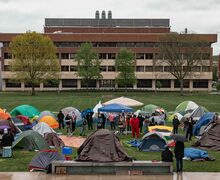Pay attention to Syracuse mayoral race. Its outcome will affect SU students
Corey Henry | Senior Staff Photographer
Syracuse University students should be actively participating in the Syracuse mayoral election.
Syracuse University students should be spending more time reflecting on this year’s mayoral race in Syracuse. Students should be asking themselves questions such as “What changes do community members want to see?” and “Will one candidate bring change faster than another?” so they can make an informed decision on a situation that will greatly impact the community.
Regardless of the influence SU students possess, it is crucial for students to be educated on the individuals who will conceivably lead the city. This race has the potential to greatly impact the surrounding community, so before students preach for one candidate or another, they must understand their privilege, listen to community members and remember that their words have power.
Election day is Tuesday and this race has already made history. Khalid Bey is the first Black man to ever win major party backing, and he has the opportunity to be the first Black mayor in Syracuse, according to syracuse.com.
Meanwhile, incumbent Ben Walsh looks to defend his independent seat as mayor, continuing his plan to rebuild Syracuse, work on police reform and continue the legacy of the Walsh family in central New York.
Janet Burman is also running as a Republican but did not receive Republican Party backing for her mayoral bid. The two frontrunners in this election are Bey and Walsh, however, Burman has the potential to draw enough voters to determine the election in Bey’s favor.
Syracuse students should advocate for the mayor who holds the community’s wants and needs ahead of any political or economic agenda. While Bey may have the lived experience and wisdom to uplift the Syracuse community, incumbent Walsh has done work that shows his commitment to the city irrespective of political identity. Both Walsh and Bey voice their support of the Black Lives Matter movement and advocate for community policing and police reform, but they approach bail reform and finance differently.
This election has qualified candidates that genuinely think they will do what is best for the community. But without acknowledging the struggles and systems of oppression that operate daily on individuals in Syracuse, politicians will not produce radical change.

What SU students need to do is listen, listen to those at the intersections of identity and support marginalized people. Patricia Hill Collins, a sociology professor at the University of Maryland, explains the intersectionality of race, gender and class in the U.S., specifically how Black women are at a disadvantage.
“In the United States, the policies and procedures of the U.S. legal system, labor markets, schools, the housing industry, banking, insurance, the news media, and other social institutions as interdependent entities have worked to disadvantage African-American women.”
In Syracuse, the Black Artist Collective of central New York and BlackCuse Pride said that they felt unheard by policy-makers after the uniformed officers were required to be present at their Juneteenth celebration.
“The fact that we still have to go to lengths to explain this wrongness only to be unheard and run over is harmful to say the least,” the BAC said in a statement on Instagram.
Kayla Johnson, one of the leaders of Rebirth SYR, said during a protest one year after the murder of George Floyd that policy-makers are more likely to listen if more people speak out.
“We need more people to be boisterous and speak out and not hold back how they feel,” she said. “It can’t just be two or three of us. … But if three or four-five hundred speak out, it’s a big difference.”
SU students must acknowledge the epistemic systems that continue the status quo of violence and discrimination against marginalized people, especially in the Syracuse community. The majority of SU students are only in Syracuse for four years, but their impact on the community is immense. Elections can bring change and the community keeps moving, but if the wrong person is elected, our community may not progress in the way we hoped.
Andrew Lieberman is a junior citizenship and civic engagement and political science dual major. His column appears biweekly. He can be reached at [email protected].
Published on November 1, 2021 at 9:06 pm




